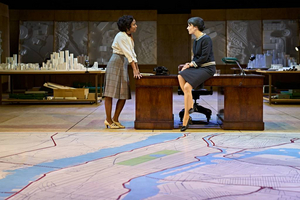Review: STRAIGHT LINE CRAZY, Bridge Theatre
Ralph Fiennes excels in David Hare's new play about New York's 20th century development

 There's always someone hurt (or worse) when powerful men draw lines on maps. Sometimes it's soldiers ordered to advance the front line, sometimes it's whole populations caught on the wrong side of imperial borders and sometimes it's individuals standing in the way of progress (what a loaded word that is).
There's always someone hurt (or worse) when powerful men draw lines on maps. Sometimes it's soldiers ordered to advance the front line, sometimes it's whole populations caught on the wrong side of imperial borders and sometimes it's individuals standing in the way of progress (what a loaded word that is).
Robert Moses drew lots of lines on the maps of New York City, lurid red ones on Bob Crowley's carpet covering much of the stage in David Hare's new play, allowing him to bestride his domain like the Colossus of Rhodes. Those lines were the expressways, the urban motorways that pumped cars round the five boroughs and took families to the open spaces and beaches of Long Island. En route, Moses's lines smashed through long-established neighbourhoods, decanting their inhabitants miles away, breaking up communities, replacing souls with cars.
But if the new homes were not (or, more accurately, less) rat-infested, isn't that a good thing? If New Yorkers could drive to the shores and swim or play tennis, isn't that a good thing? And if the people displaced were often Black and Hispanic who relied on public transport (definitely not in the plan), they were just the eggs in the omelette. A Philosopher King like Moses could hardly build his promised land without some hearts bleeding, could he?
With slogans like "Build Back Better" on hand when a politician needs something abstract and hopeful to point at, Moses is an interesting choice for one of Hare's regular check-ins on the state of the nation. Ralph Fiennes plays him as ruthless, charming, driven, bombastic and effective, a firm believer in it being better to apologise later than to request permission now. He also knows exactly what he's doing, so he's racist too.
Often plays as focussed on an individual as this one can turn entirely on the central performance (and Fiennes is dazzling in the role), but Siobhán Cullen, Louise Brooks bob for the 1920s first half and career woman suiting for the 1950s second, is tremendous as Moses's long term collaborator and confidante, Finnuala Cullen. She lifts a part that threatens to be solely present to facilitate slabby exposition into a real person, somewhere between Mad Men's Joan Harris and Peggy Olson.
Danny Webb's cameo as Governor Al Smith provides some welcome comic relief, swigging bourbon during Prohibition and swearing like, well, like an Irishman who grew up in the tenement blocks of the Lower East Side. His brand of Realpolitik worked for both men - Moses's tight focus on outcomes complementing Smith's brand of politics as entertainment and shady deals (who can Hare be alluding to with that?) propping up a base that delivered 19 consecutive victories at the ballot box for Smith. If those outside his core support suffered, they didn't have enough votes - that's democracy where 52 beats 48 doesn't it?
With Smith regrettably absent, dead, director, Nicholas Hytner, struggles to inject the zip of the first half into the second, Moses (as all career politicians will, elected or not) now mired in the intellectual stasis that results from believing one's own publicity. But his newest line on the map, an expressway through Washington Square, is doing the opposite of his earlier North and South Parkways. Instead of taking the middle classes to their leisure, it is denying them it, slicing a green space in half, not creating one. A new alliance forms to resist him, led by an actress Shirley Hayes (Alana Maria) who can work an audience and a young town planner in his office, Mariah Heller (Alisha Bailey, also excellent) who challenges Moses from within, as his beloved Finnuala once did - but Mariah has the winds of history at her back and she doesn't back down.
My father grew up in the kind of housing that Moses's bulldozers cleared and he always said that the car represented freedom, the escape route from the smoke and dirt of the city. He could, just about, afford a series of second-hand jalopies and I benefited from that as a child of the 60s. It's important to locate the psychological effects and social impacts of Moses's decisions within their time, either side of World War II - for many the car was no bogeyman, the suburbs no node of alienation, hot running water a novelty. It's no surprise that Britain's nascent anti-Net Zero political movement attracts support from those nostalgic for those times.
The roads, the parks and the urban displacements would never have happened without a man like Moses willing the city into transformation, the unelected, unbeholden Philosopher King with his maps and his concrete mixers and relaxed view of the victims of his plans. Such men have their uses, but the problem with Philosopher Kings is that the only people suitable for the role would never take it - and we're left with the narcissists, the self-servers and the incompetents. We even elect them from time to time too, just to make things worse..
Straight Line Crazy is at the Bridge Theatre until 18 June and will be broadcast live to cinemas on Thursday 26 May
Photo Manuel Harlan
Reader Reviews



